-
United States Becomes Handout Nation With Half Living in a Household Receiving Government Benefits

Nearly half of all Americans live in households that received some government benefit in the first quarter of 2010, according to census data.
Families were more dependent on government programs than ever last year.Nearly half, 48.5%, of the population lived in a household that received some type of government benefit in the first quarter of 2010, according to Census data. Those numbers have risen since the middle of the recession when 44.4% lived households receiving benefits in the third quarter of 2008.
The share of people relying on government benefits has reached a historic high, in large part from the deep recession and meager recovery, but also because of the expansion of government programs over the years. (See a timeline on the history of government benefits programs here.)
Means-tested programs, designed to help the needy, accounted for the largest share of recipients last year. Some 34.2% of Americans lived in a household that received benefits such as food stamps, subsidized housing, cash welfare or Medicaid (the federal-state health care program for the poor).
Another 14.5% lived in homes where someone was on Medicare (the health care program for the elderly). Nearly 16% lived in households receiving Social Security.
High unemployment and increased reliance on government programs has also shrunk the nation’s share of taxpayers. Some 46.4% of households will pay no federal income tax this year, according to the nonpartisan Tax Policy Center. That’s up from 39.9% in 2007, the year the recession began.
Most of those households will still be hit by payroll taxes. Just 18.1% of households pay neither payroll nor federal income taxes and they are predominantly the nation’s elderly and poorest families.
The tandem rise in government-benefits recipients and fall in taxpayers has been cause for alarm among some policymakers and presidential hopefuls.
The American economy is facing a collapse unless something is done by the federal government to stimulate economic growth. And, America is not going to achieve this by taxing the rich.
President Obama and Senate Democrats have better get serious about the economy or get the hell out of the way and let the GOP House do it.
-
Poll Watch: Americans By a Small Majority Blame Obama for the Economy – But Still Blame Bush More
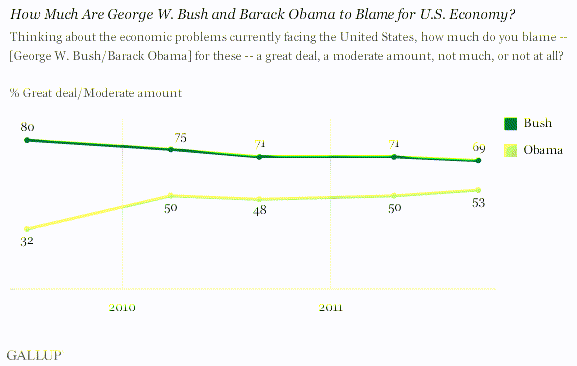 According to the latest Gallup Poll.
According to the latest Gallup Poll.A slight majority of Americans for the first time blame President Obama either a great deal (24%) or a moderate amount (29%) for the nation’s economic problems. However, Americans continue to blame former President George W. Bush more. Nearly 7 in 10 blame Bush a great deal (36%) or a moderate amount (33%).
Gallup found a substantially wider gap in public perceptions of how much responsibility Bush and Obama each bore for the economy when it first asked the question in July 2009, the sixth month of Obama’s presidency. That narrowed by March 2010, caused mainly by a jump in the percentage blaming Obama a great deal or moderate amount, and has since changed relatively little. However, the results from a new Sept. 15-18 USA Today/Gallup poll are the first showing a majority of Americans, 53%, assigning significant blame to Obama. Forty-seven percent still say he is “not much” (27%) or “not at all” (20%) to blame.
I think Americans realized that after the Bush Presidency they must give President Obama a chance and have given him a honeymoon of sorts. But, the bloom has come off the rose.
But, more Republicans are willing to blame Bush more than Democrats to blame Obama, so electorally, this does not help the President’s re-election prospects.
The chart:
 So, what does this all mean?
So, what does this all mean?President Obama is now accruing blame for the poor economy. Since President Bush will not be on the ballot, he had better find either an economic solution or a better excuse than it is Bush’s fault (particularly with independent voters).
Former President Bush continues to take a harder hit than President Obama in public perceptions of who is responsible for the nation’s ongoing economic problems. However, that is largely because Republicans are more willing to blame Bush than Democrats are to blame Obama. Because most Republicans and Democrats are going to vote for their own party’s presidential candidate in 2012, this imbalance won’t help Obama much electorally.
More importantly, about 6 in 10 political independents believe both presidents bear considerable blame. That is not good news for Obama. In his re-election campaign, he will likely try to convince independents that although the economy hasn’t markedly improved on his watch, his policies prevented the bad economic situation he inherited from Bush from becoming even worse.
Other Gallup polling confirms that the economy is going to be a treacherous issue for Obama to navigate in the coming year. At 26%, his most recent approval rating on the economy, from August, is his lowest to date, and Americans’ economic confidence remains weakened compared with earlier this year, after the bruising debt ceiling debate over the summer. The public may not see Obama as culpable for the economy to the same degree as Bush, but that won’t be sufficient protection from voters’ wrath if the majority — including 60% of independents — nevertheless considers him highly responsible.
-
Poll Watch: Americans Favor Taxing the Rich and Obama’s Job Plan
 According to the latest Gallup Poll.
According to the latest Gallup Poll.Americans generally favor raising taxes on higher-income Americans and eliminating tax deductions for some corporations as ways of paying for President Obama’s proposed jobs plan.
Slightly more than half of rank-and-file Republicans and Republican-leaning independents favor the idea of eliminating certain corporate tax deductions as a way to pay for a jobs creation bill. Forty-one percent of Republicans favor raising taxes on higher-income Americans. Democrats strongly favor both proposals for paying for the cost of the jobs bill.
Not really a surprise because nobody considers themselves rich. But, how can anyone possibly think this will lead to job creation?
Americans Favor Almost All Proposals in Obama’s Jobs Plan
Americans agree with a number of the job-creation proposals included in Obama’s jobs plan — specifically including the ideas of providing tax cuts to small businesses; providing additional funds for hiring teachers, police officers, and firefighters; and giving tax breaks to corporations for hiring the long-term unemployed. Slightly less than half favor reducing Social Security taxes for workers and employers.
The chart:
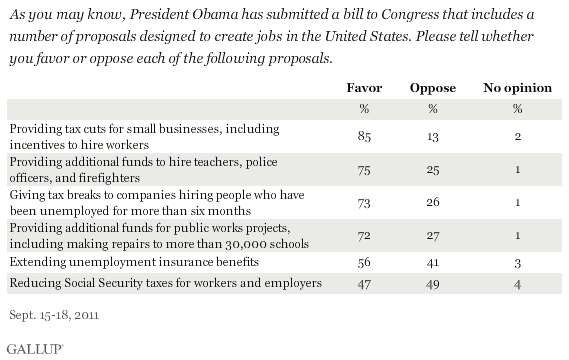 So, what does this all mean?
So, what does this all mean?This is the second Gallup survey conducted in the last two weeks showing that the American public broadly supports Obama’s jobs plan. A majority of Americans interviewed this past weekend believe the plan would help at least a little to create jobs and improve the economy.
Many of the proposals embedded in the plan receive majority support, and Americans strongly endorse the idea of paying for the plan by raising taxes on higher-income individual taxpayers and by eliminating tax deductions for some corporations. While Republicans are considerably less positive about the potential efficacy of the plan than are Democrats, a majority of the former favor a number of Obama’s proposals, and also favor eliminating tax deductions for corporations to help fund the plan.
But, the real question is whether these proposals work? Will any jobs be created?
Popularity may win you votes, but not necessarily produce an improving economy.
-
Poll Watch: Unemployment Rate Improves in Mid-September to 8.8% But Underemployment Remains High
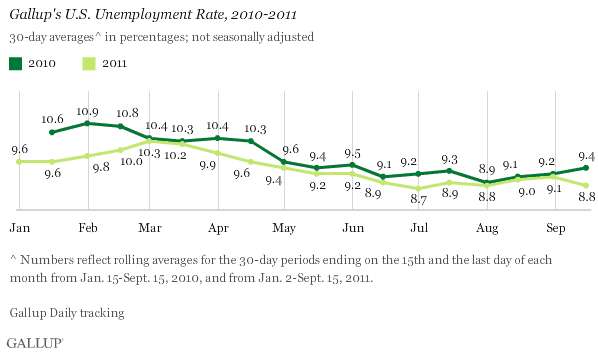 According to the latest Gallup Poll.
According to the latest Gallup Poll.Unemployment, as measured by Gallup without seasonal adjustment, is 8.8% in mid-September — down from 9.1% at the end of August and the same as it was at the end of July. However, the apparent improvement in unemployment from August to mid-September may merely reflect normal seasonal hiring patterns and not be an indication that the employment situation is improving. On the other hand, current unemployment is considerably better than the 9.4% of a year ago.
But……
Underemployment remains stuck at 18.5% in Mid-September.
Underemployment, a measure that combines the percentage of workers who are unemployed with the percentage working part time but wanting full-time work, is 18.5% in mid-September — the same as the 18.5% at the end of August and the 18.6% of mid-September a year ago.
Number Forced to Take Part-time Work Increases
Offsetting the drop in the percentage of unemployed is an increase to 9.7% in the percentage of part-time workers who want full-time work in mid-September — up from 9.4% at the end of August and its highest level since mid-June. It is also up from 9.2% in mid-September last year. It is this increase, coupled with the downturn in unemployment, that yields the stability this month in the measure of overall underemployment.
The chart:
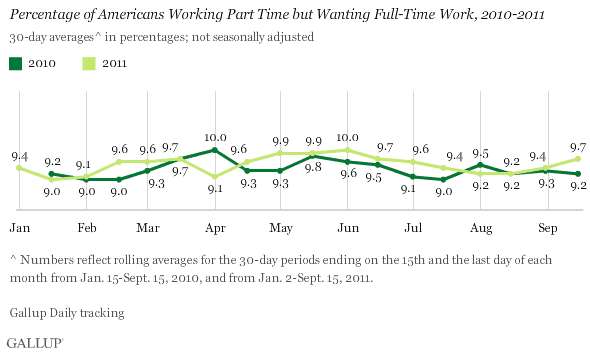
Gallup’s issues a caveat that the improving unemployment rate may not indicate that the employment situation is improving appreciably because of the difference in their polling methodology as compared to the government’s. Gallup maintains that the underemployment rate is a better indicator.
Nearly one in five Americans remain underemployed this year, as was the case a year ago, and the figures are worse for certain subgroups, including 28.9% underemployment for those 18 to 29, 23.1% for those who have not attended college, and 27.8% among blacks.
More Americans are now being forced to take part-time jobs when they really want full-time work. Focusing merely on unemployment instead of underemployment tends to ignore the hardship facing the millions of Americans forced to work part time. The long-term implications of this jobs situation — particularly among specific groups of Americans — for U.S. society as a whole may be more important than any of the major topics currently being debated nationally.
In other words, the employment situation is not improving appreciably.
-
Poll Watch: Three Years After Economic Crisis Little Sign of Amercian Relief
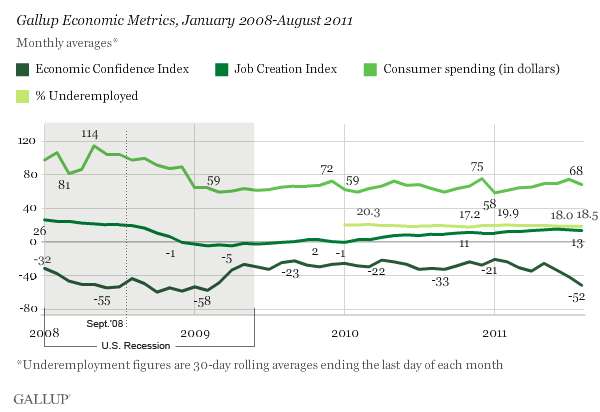 According to the latest Gallup Poll.
According to the latest Gallup Poll.Three years after bankruptcy of Lehman Brothers jolted the U.S. economy into economic turmoil, job creation has rebounded from post-collapse lows, but economic confidence and consumer spending remain within the ranges seen in 2009. Gallup finds underemployment and unemployment essentially where they were a year ago.
Gallup has been tracking Americans’ economic confidence, consumer spending, and employee reports about hiring and firing at their workplaces since 2008, and employment since January 2010, as part of its Gallup Daily tracking program. The findings in this analysis are based on monthly averages, based on approximately 15,000 interviews per month.
Here is the summary of findings:
- Economic Confidence: Back at Recessionary Levels
- Job Creation: Improved From 2009-2010 Lows, but Far From Early 2008 Levels
- Underemployment and Employment: Stuck at Year-Ago Levels
- Consumer Spending: Nowhere Near 2008 Levels
So, what does it all mean?
President Obama and his Administration have not been successful in steering the economy towards economic recovery. Failure is a word that comes to mind and it is reflected in many polls showing Obama struggling in approval ratings.
-
United States Poverty Rate Soars – Nearly 1 in 6 Americans
 Remember in 2008, when Senator and then Presidential candidate Barack Obama told Joe the Plumber about “spreading the wealth around.”
Remember in 2008, when Senator and then Presidential candidate Barack Obama told Joe the Plumber about “spreading the wealth around.”Guess it wasn’t wealth that Obama spread around.
The ranks of U.S. poor swelled to nearly 1 in 6 people last year, reaching a new high as long-term unemployment woes left millions of Americans struggling and out of work. The number of uninsured edged up to 49.9 million, the biggest in over two decades.
The Census Bureau’s annual report released Tuesday offers a snapshot of the economic well-being of U.S. households for 2010, when joblessness hovered above 9 percent for a second year. It comes at a politically sensitive time for President Barack Obama, who has acknowledged in the midst of his re-election fight that the unemployment rate could persist at high levels through next year.
The overall poverty rate climbed to 15.1 percent, or 46.2 million, up from 14.3 percent in 2009.
Reflecting the lingering impact of the recession, the U.S. poverty rate from 2007-2010 has now risen faster than any three-year period since the early 1980s, when a crippling energy crisis amid government cutbacks contributed to inflation, spiraling interest rates and unemployment.
Measured by total numbers, the 46 million now living in poverty is the largest on record dating back to when the census began tracking poverty in 1959. Based on percentages, it tied the poverty level in 1993 and was the highest since 1983.
The share of Americans without health coverage rose from 16.1 percent to 16.3 percent — or 49.9 million people — after the Census Bureau made revisions to numbers of the uninsured. That is due mostly because of continued losses of employer-provided health insurance in the weakened economy.
One term President cannot happen too soon.
-
Video: Under President Obama Will America End Up Like Detroit?
President Obama delivers a Labor Day address in Detroit, Michigan, where unemployment rates are skyrocketing and more and more homes are falling into foreclosureCalifornia, especially Los Angeles is well on its way to becoming a Detroit – but with better weather. -
President 2012: Why Obama Loses in 2012

President Barack Obama walks with his daughter Sasha Obama across the South Lawn of the White House in Washington, Friday, Sept. 2, 2011, to board Marine One en route to Camp David
I think Jen Rubin has it about right.The Associated Press headline reads: “Employers added no net jobs in August, while unemployment rate was unchanged at 9.1 pct.” The New York Times blasts: “U.S. Showed No Job Growth in August; Rate Stays at 9.1%.” But equally apt would be: “Obama’s reelection prospects nose-dive.” Given that we are, for the first time in 11 months, not creating any new jobs, the outlook for a double-dip recession is real. And, moreover, even if we do not slip into consecutive quarters of negative growth (the technical definition of “recession”), we are certainly heading in the wrong direction. According to Matt McDonald, a former Bush official and now a business consultant, in order to get to 8 percent unemployment by Election Day we would need 270,000 new jobs each month. To get to 8.5 percent we would need to create 215,000 jobs monthly. Just to inch down to 9 percent would require 159,000 jobs every month.
Not surprisingly, the GOP contenders pounced…
With economic conditions so poor and no hope for an immediate turn around, President Obama will struggle to change the narrative – his Presidency is a FAILED one.
But can the Republican Presidential candidates close the deal?
-
President 2012: Obama = President Zero
 I think the moniker will stick.
I think the moniker will stick.It took the Republican National Committee exactly 94 minutes to coin a new, demeaning title for Barack Obama: President Zero.
In an e-mail to reporters, the committee took note of the worst jobs report in nearly a year, saying that there has been “two and a half years of Obamanomics and nothing to show for it.”
The monthly report, which showed a 17,000-job gain among private employers but no growth over all, provides Mr. Obama’s Republican rivals with the perfect opportunity to criticize him as they prepare to gather for another nationally televised debate next week.
And it gives Mr. Obama an even more gloomy backdrop for the jobs speech he will give to a joint session of Congress next Thursday. In the speech, Mr. Obama is expected to call for a renewed national effort to put people back to work and trim the nation’s deficit.
In the meantime, the Republicans competing for their party’s nomination used the latest jobs numbers to slam the president for his stewardship of the nation’s economy.
Obama certainly has NO record on the economy on which to run for re-election. This bankruptcy of a California company which was propped up by American taxpayer stimulus funds is a case in point.
But, more on point are today’s economic numbers:
-
Poll Watch: U.S. Unemployment Increases in August – Underemployment Worsens
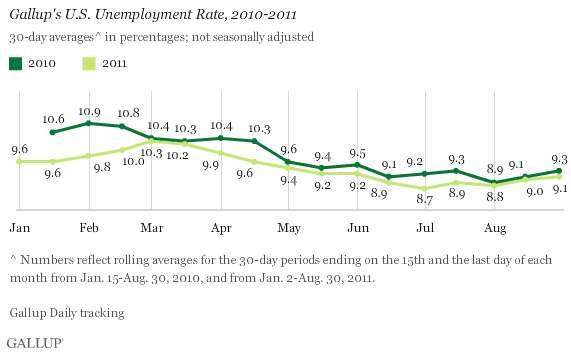
According to the latest Gallup Poll.Unemployment, as measured by Gallup without seasonal adjustment, is at 9.1% at the end of August — up from 8.8% at the end of July.
This data further confirm Gallup’s mid-month prediction that the August unemployment rate that the government will report Friday will be higher than the 9.1% it reported in July — barring another sizable decline in the U.S. workforce or an unusual seasonal adjustment.
The percentage of part-time workers who want full-time work is at 9.4% at the end of August — up from 9.2% in mid-August and at the end of July.
Underemployment Worsens
Underemployment, a measure that combines the percentage of workers who are unemployed with the percentage working part time but wanting full-time work, is 18.5% at the end of August — up from 18.0% at the end of July.
The chart:
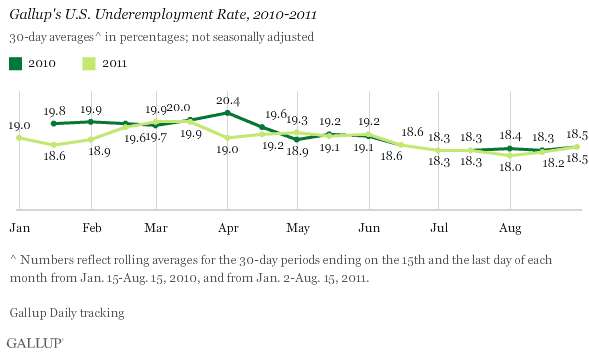
Remember no American President has been re-elected with an unemployment rate above 8 per cent, except for ronald Reagan where the trend was markedly toward more employment. Hence, this is why President Obama is giving a “JOBS” speech next Thursday.
While the dismal job situation is a negative for the economic outlook, unemployment is generally seen as a lagging indicator. Americans’ worries about potentially being laid off are much more of a leading indicator, and Americans are now worried about losing their jobs to the same degree they were in 2009. People are likely worried about their job situation both because their Economic Confidence is low, and because they fear their companies may be scaling back on hiring. When a large percentage of Americans are worried about their jobs, it does not bode well for consumer spending or the prospects for another recession.
